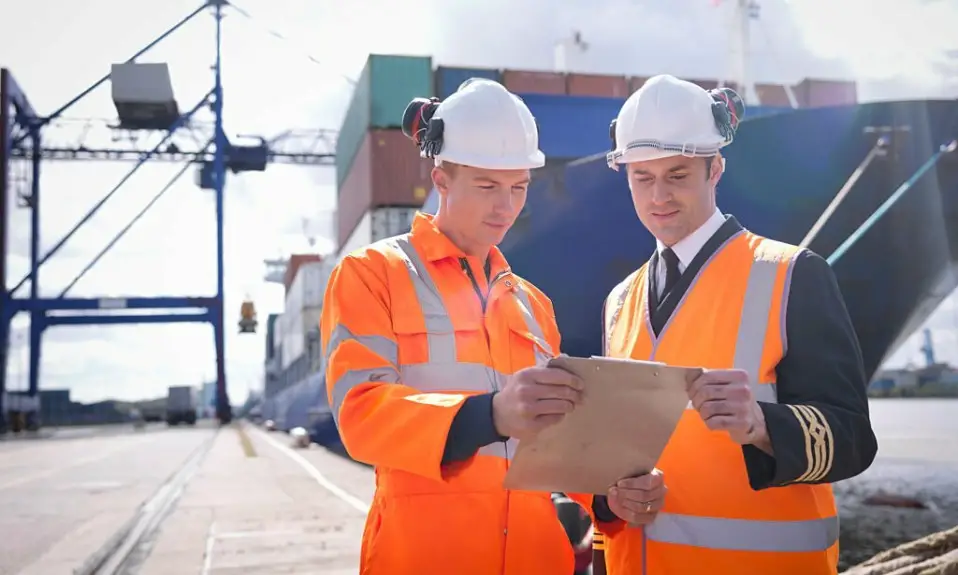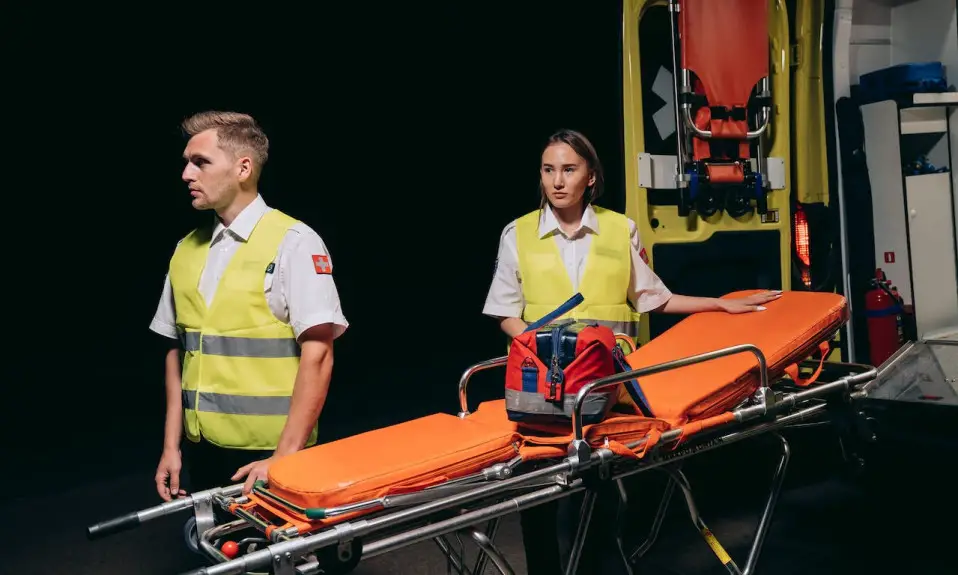
Advertorial: This post contains sponsored content, advertisements, or affiliate links. Read our full advertorial disclosure here.
Have you ever wondered what it takes to work on a container ship? These massive vessels are responsible for transporting the vast majority of the world’s goods, and they require a highly skilled and experienced crew to operate them. In this blog post, we will discuss the different requirements needed to work on a container ship, including education, licenses and certifications, job responsibilities, and work environment.
Working on a container ship is a unique career that allows you to travel the world while living and working at sea. However, it also comes with special requirements and is not suitable for everyone.
Education Requirements
Working on a container ship can be a rewarding and exciting career, but it does require a certain level of education and training. The minimum educational requirement to work on a container ship is typically a high school diploma or equivalent qualification. However, some positions may require additional education, such as a bachelor’s degree in marine transportation or a related field.
If you are interested in a career on a container ship, there are a few things you can do to prepare yourself. First, make sure you have a strong foundation in math and science. You should also be proficient in English, both written and spoken. Additionally, it is helpful to have some experience working in a customer service or logistics role.
In addition to formal education, there are also a number of apprenticeship programs available that can provide you with the skills and experience you need to work on a container ship. These programs typically last for two to three years and combine on-the-job training with classroom instruction.
Once you have completed your education and training, you will need to obtain a Merchant Mariner Credential (MMC) from the United States Coast Guard. The MMC is a government-issued document that certifies that you have the knowledge and skills necessary to work on a commercial vessel.
With the proper education and training, you can open up a world of opportunities for yourself in the maritime industry. Working on a container ship can be a challenging but rewarding career, and it offers the chance to see the world and make a difference in the global economy.
Background Requirements
Working aboard a merchant ship has legal requirements regarding nationality, age, and medical fitness. Here are the essential background criteria:
1. Nationality
- Most container shipping companies require candidates to have a passport from specific countries like the Philippines, India, Eastern Europe, etc.
- Due to security clearances, certain nationalities may not qualify to work aboard ships visiting particular ports.
2. Minimum Age
- Minimum age is 18 years for most ratings or support level roles.
- Officers need to be 21 years or older in most countries.
3. Medical and Eyesight
- All crew need to clear a pre-sea medical test confirming fitness.
- Eyesight requirements are stringent, corrected vision should be 6/6 in better eye and 6/9 in other.
4. Background and Reference Checks
- Companies will check criminal history, verify certificates, and contact references.
- Some may even require a pre-training period or probation.
Essential Skills
In addition to formal training, certain soft skills help prospective candidates adapt better to life at sea:
- Physical fitness for enduring harsh weather and carrying out duties tirelessly
- Emotional stability since crew work long hours in confined spaces
- Communication skills for collaborating with a multi-national crew
- Time management and ability to follow procedures
Formal Training
Merchant maritime crew are highly trained professionals upholding stringent standards of competency and certification.
Pre-Sea Courses
- New entrants must complete basic safety and survival certificates mandated by the STCW convention like Personal Survival Techniques, Fire Prevention and Fire Fighting, Elementary First Aid, and Personal Safety and Social Responsibility.
Job-Specific Training
The role determines the type of training needed-
| Deck Cadet | BSc Nautical Sciences |
| Engine Cadet | BEng Marine Engineering |
| Rating (OS, AB, Motorman, Fitter etc.) | Approved pre-sea course in rating specialty |
| Chief Cook, Baker, Butcher | Cooking and food handling certification |
- Officers need to qualify in additional advanced programs in navigation/marine engineering as they rise up the ranks.
- Ratings also supplement initial training with specialized courses to gain promotability.
Certification Exams
Crew members must pass oral, written, and practical exams conducted by merchant marine authorities to obtain mandatory certificates of competency and watchkeeping licenses.
Licenses and Certifications
In addition to a Merchant Mariner Credential (MMC) license, there are several other licenses and certifications that may be required to work on a container ship, depending on your specific job duties. These may include:
1. Able Seaman (AB) license: This license is required for any crew member who is responsible for the safe operation of the ship, including deckhands, helmsmen, and lookouts. To obtain an AB license, you will need to pass a written exam and a practical skills test.
2. Qualified Member of the Engine Department (QMED) license: This license is required for any crew member who is responsible for the operation and maintenance of the ship’s engines, including engineers, mechanics, and electricians. To obtain a QMED license, you will need to pass a written exam and a practical skills test.
3. U.S. Coast Guard approved medical certificate: All crew members must have a U.S. Coast Guard approved medical certificate in order to work on a container ship. This certificate must be renewed annually.
It is important to note that the specific licenses and certifications required to work on a container ship may vary depending on the shipping company and the country in which the ship is registered. It is always best to check with the shipping company or the relevant maritime authority to determine the exact requirements for the position you are interested in.
Additional Requirements
Besides formal credentials, smart candidates also prepare for life at sea by:
- Learning basic phrases in English to communicate with multinational crewmates
- Reading up on shipboard etiquette, protocols, and terminology
- Understanding typical shipboard hierarchy, reporting structure, and duties mapped to roles
- Familiarizing with safety, security and emergency duties per muster lists
- Packing suitable personal clothing and gear for extended periods at sea
Being mentally and logistically prepared makes the transition smooth when crew sign on to their first ship.
Read Also: Maritime Worker’s Guide to Winter Safety
Comparison of Officer vs. Rating Routes
While both officers and ratings can build rewarding careers at sea, their routes have key differences:
| Parameter | Officer | Rating |
|---|---|---|
| Qualifications | Bachelors/Masters degree | Approved pre-sea course |
| Training Period | 36-48 months | 3-9 months |
| Career Progression | Sequential promotions to Captain | Can reach Boatswain or Serang but limited upward path |
| Salary Scale | Higher, especially in senior roles | Lower than officers but still above land-based roles of similar qualification level |
| Contracts | Generally 6-9 months duration | Routinely sign shorter contracts of 2-6 months duration |
| Leave Period | 1 month leave or vacation between contracts | 7-30 days leave between contracts |
| Duties | Responsible for navigation/engineering and crew management | Support vessel operations in deck, engine room or catering/hospitality departments |
Both routes enable young people without higher education degrees to achieve financial security and get exposure by traveling the world. The major difference is that the officer route requires a longer training period but offers greater leadership opportunity over time.
Job Responsibilities
The job responsibilities of those who work on container ships are varied and demanding. They include loading and unloading cargo, operating and maintaining shipboard machinery, navigating the ship, and ensuring the safety of the ship and its crew.
Deck officers are responsible for the safe navigation of the ship. They work closely with the captain to plot the ship’s course, monitor weather and sea conditions, and ensure that the ship is properly equipped and maintained. Deck officers also supervise the loading and unloading of cargo and may operate cranes and other equipment.
Engineering officers are responsible for the operation and maintenance of the ship’s machinery. They work in the engine room to monitor and control the ship’s engines, boilers, and other mechanical systems. Engineering officers also perform maintenance and repairs on the ship’s machinery and may supervise a team of engineers.
Able-bodied seamen (ABs) are responsible for the general maintenance of the ship. They work on deck to load and unload cargo, clean the ship, and perform other tasks. ABs may also be assigned to work in the engine room or other areas of the ship.
Ordinary seamen (OSs) are entry-level positions on container ships. They work under the supervision of ABs and may be assigned to a variety of tasks, such as loading and unloading cargo, cleaning the ship, and performing other general maintenance duties.
The work environment on a container ship can be challenging. The ships are often at sea for long periods of time, and the work can be physically demanding. However, working on a container ship can also be a rewarding experience. It offers the opportunity to travel the world and meet new people, and it can be a great way to learn about the shipping industry.
Work Environment
The work environment on a container ship can be demanding, with long hours, shift work, confined spaces, exposure to hazardous chemicals, and the potential for accidents and injuries.
Long hours are a common part of working on a container ship. Shifts can last up to 12 hours, and employees may be required to work seven days a week. This can be especially challenging for those who have families or other commitments outside of work.
Shift work is another common aspect of working on a container ship. This means that employees may work different shifts on different days, which can disrupt their sleep schedules and make it difficult to maintain a regular routine.
The work environment on a container ship can also be physically demanding. Employees may be required to lift heavy objects, work in confined spaces, and be exposed to hazardous chemicals. This can lead to injuries and health problems.
Despite the challenges, working on a container ship can also be a rewarding experience. Employees have the opportunity to travel the world, meet new people, and learn new skills. They also have the opportunity to work with a close-knit team of professionals who share a common goal.
If you are considering a career on a container ship, it is important to be aware of the challenges and rewards of this unique work environment.
Frequently Asked Questions (FAQs)
What is the typical contract duration on container ships?
Contracts usually range from 2-12 months. Ratings tend to serve shorter 2-6 months contracts while officers commit to longer 6-9 months contracts between vacation periods.
How much currency can you save working on container ships?
By having limited opportunities to spend while working 12 hour days at sea, crew can save anywhere from $1000-$3000 per month depending on role and experience level.
What amenities are provided onboard container ships?
Crew amenities include WiFi access, gyms, TV lounges, deck swimming pools, laundries, saloons, and recreation spaces like basketball courts. Good food and private cabins are also provided these days.
Can women work on container ships?
Yes, all roles are now open to female crew on container vessels including deck, engine, hotel services and even captain ship. However, women still make up only 1-2% of the maritime workforce.
How do you deal with pirates and emergencies on container ships?
All crew undergo security and emergency drills per international protocols. Ships have protective barriers, surveillance systems, safe muster areas and sometimes armed guards. They follow best practices to steer clear of piracy risk areas.
Advertorial: This post contains sponsored content, advertisements, or affiliate links. Read our full advertorial disclosure here.







